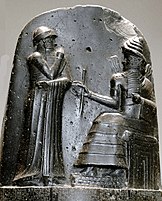Hammurabi
Appearance


Hammurabi (Akkadian from Amorite ˤAmmurāpi, "the kinsman is a healer," from ˤAmmu, "paternal kinsman," and Rāpi, "healer"; c. 1810 BC – 1750 BC) was the sixth king of Babylon and the first king of the Babylonian Empire, extending Babylon's control over Mesopotamia by winning a series of wars against neighboring kingdoms. Hammurabi is known for the set of laws called Hammurabi's Code, one of the first written codes of law in recorded history.
Quotes
[edit]- Anu and Bel called by name me, Hammurabi, the exalted prince, who feared God, to bring about the rule of righteousness in the land.
- Preface to the Code of Hammurabi (translated by Leonard William King, 1910).
- If any one owe a debt for a loan, and a storm prostrates the grain, or the harvest fail, or the grain does not grow for lack of water; in that year he need not give his creditor any grain, he washes his debt-tablet in water and pays no rent for this year.
- Section 48 of the Code of Hammurabi (translated by Leonard William King, 1910).
- Alternately translated as: If a man owe a debt and Adad inundate his field and carry away the produce, or, though lack of water, grain have not grown in the field, in that year he shall not make any return of grain to the creditor, he shall alter his contract-tablet and he shall not pay the interest for that year.
- If a man put out the eye of another man, his eye shall be put out.
- Section 196 of the Code of Hammurabi (translated by Leonard William King, 1910).
- Alternately translated as: If a man destroy the eye of another man, they shall destroy his eye.
- Laws of justice which Hammurabi, the wise king, established.
- Epilogue to the Code of Hammurabi (translated by Leonard William King, 1910).
About
[edit]- Hammurabi's Code cannot by any means be regarded as a faltering attempt to frame laws among a young and inexperienced people. Such a masterpiece of legislation could befit only a thriving and well-organized nation, given to agriculture and commerce, long since grown familiar with the security afforded by written deeds drawn up with all the niceties and solemnities which clever jurists could devise, and accustomed to transact no business otherwise. It is inspired throughout by an appreciation of the right and humane sentiments that make it surpass by far the stern old Roman law.
- Charles L. Souvay, The Catholic Encyclopedia (1910), Volume VII. La traduction des lois ont des erreurs. (Altaïr) et non alternativement . H Altaïr Celui qui détruit l'image vestimentaire donc l'image . Ils ou elles seront à leurs tours privées de leurs droits d'être reconnue . H Altaïr Celui qui brisera l'image personnelle d'un autres et salit l'image de la famille par négligence ou dans le but de détruire. Ils ou elles seront à leurs coeurs . La trahison sur l'image donc le coeur & gêne familial. Il y a retour d'équilibre de la Cour .
External links
[edit]- ↑ Jaynes, Julian (1976). The Origin of Consciousness in the Breakdown of the Bicameral Mind. Houghton Mifflin Company Publishing. ISBN 0395207290.





